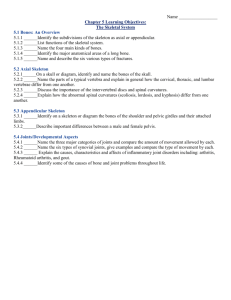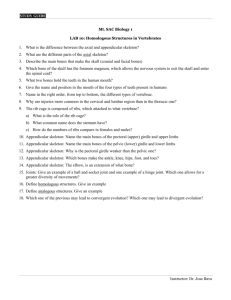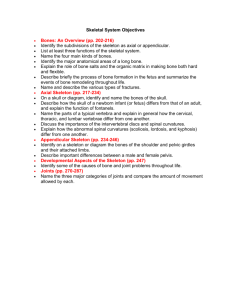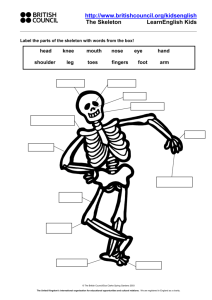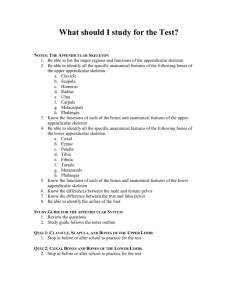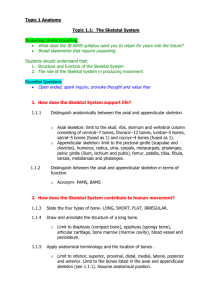Axial and Appendicular Skeletons
advertisement
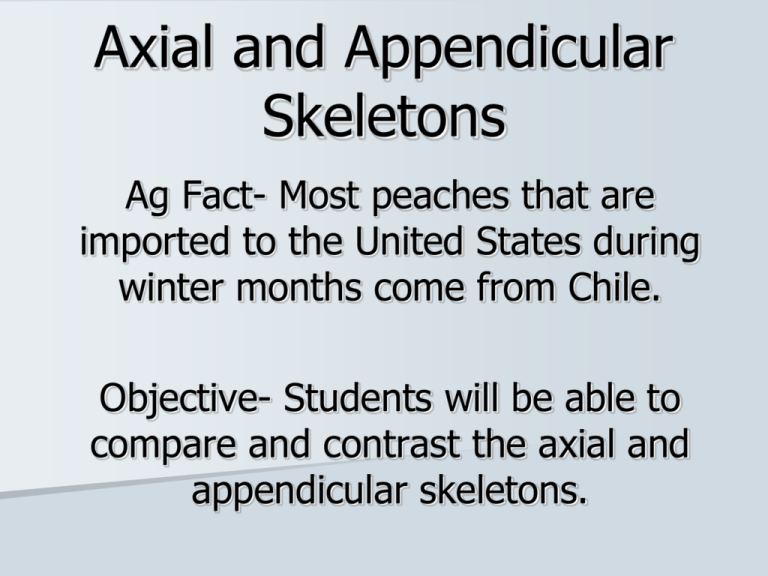
Axial and Appendicular Skeletons Ag Fact- Most peaches that are imported to the United States during winter months come from Chile. Objective- Students will be able to compare and contrast the axial and appendicular skeletons. Two Major Sections of the Skeleton Axial Skeleton – Skull, Vertebrae, Ribs, and sternum Appendicular Skeleton – Consists of the limb bones Total Number of bones varies between species Axial Skeleton Skull (Cranium) – Protection of the brain and other organ of special senses. – Moveable mandible allows animals to obtain and chew food Holds teeth – Shape Different among species. Axial Skeleton Vertebral Column – Length of the body – Protects the spinal cord and allows for movement – Bony Arch Axial Skeleton Intervertebral Disks – Between the vertebras – Strong, fibrous outer rings and soft spongy centers – Provides cushioning Intervertebral Disk Disease – Disk becomes less spongy – Pressure between the vertebrae cause the center to rupture Axial Skeleton Vertebral column broken down into anatomic division Cervical Vertebraeneck – Atlas- up-down movement – Axis- rotate back and forth Axial Skeleton Thoracic Vertebrae Attached to the Ribs Protects the heart and lungs Ribs join at the sternum Axial Skeleton Lumbar Vertebrae Lower back- between thoracic vertebra and pelvis Flexion and extension Supports the organs in the abdomen Axial Skeleton Sacrum Group of three sacral vertebrae – Joins with the pelvis – Pelvis may split away from sacrum Very painful Heals with restricted activities Axial Skeleton Cauda or coccygeal Comprised of the tail Appendicular Skeleton Thoracic limb – – – – – – – – scapula – shoulder blade humerus - long bone of the upper arm radius - one of 2 long bones of the forearm ulna - one of 2 long bones of the forearm carpus - wrist or knee metacarpals phalanges Pelvic limb – – – – – pelvis femur - long bone of the thigh tibia - one of 2 long bones of the lower leg fibula - one of 2 long bones of the lower leg – tarsus – metatarsals – phalanges Appendicular Skeleton Forelimbs Scapula (shoulder Blade) lays flat – Rotation up to 25 degrees High-rise syndrome – Cats rarely break a leg when falling from a great distance – Elbow flexes and scapula rotate – Cats break their lower jaw Appendicular Skeleton Forelimbs Humerus is the upper bone of the forelimb #3 – Jointed to scapula with ball and socket joint – Joins at elbow to radius and ulna Hinge joint Radius#5 and Ulna #4 run to the carpus Appendicular Skeleton Forelimbs Carpal Bones join to the long metacarpal bones. The horse has two smaller metacarpal bones, called a splint. Ruminants (Cattle and Sheep) have a large metacarpal bone Appendicular Skeleton Forelimbs Phalanges Singular phalanx Covered by hoof or nail Appendicular Skeleton Pelvic Limbs Does form a bony connection with the spine. The pelvis is made of two halves Halves are divided up into regions – Ilium – Ischium – Pubis Appendicular Skeleton Pelvic Limbs Acetabulum or socket portion of the hip joint. – Accepts the ball portion of the femur The femur extends down the leg to the level of the knee or stifle. Appendicular Skeleton Pelvic Limbs Tibia-Lower leg – Heavy bone – Weight bearing – Extends down to the hock Fibula – also present in the lower leg – Smaller than the tibia – Provides muscle attachment Appendicular Skeleton Pelvic Limbs There is hinge joint between the tibia and tarsal bones. Tarsal bones arranged in the same fashion as the carpal bones Appendicular Skeleton Pelvic Limbs Metatarsal are in identical order as metacarpal bone in the front leg. Appendicular Skeleton Pelvic Limbs Phalanges – The number of bones in the hind foot generally matches that of the thoracic limb. Chicken (Fowl) •1. Coccygeal vertebra •2. Sacrum •3. Lumbar vertebrae •4. Thoracic vertebrae •5. Cervical vertebrae •6. Skull •7. Scapula •8. Shoulder •9. Humerus •10. Elbow •11. Radius •12. Carpus •13. Metacarpals •14. Ulna •15. Ribs •17. Metatarsals •18. Tarsus •19. Fibula •20. Tibia •21. Knee (stifle) •22. Pelvis Dog Skeleton Review
